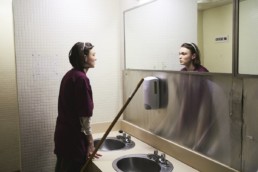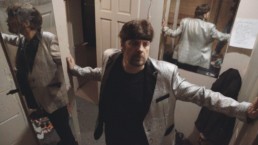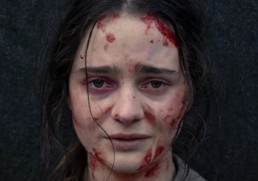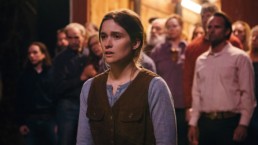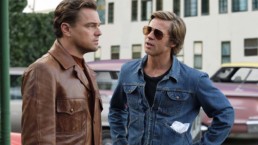Emotional Distress Turns Evil in the Artful Thriller 'Burn'
BURN (2019)
Starring Josh Hutcherson, Suki Waterhouse, Tilda Cobham-Hervey
Directed by Mike Gan
Written by Mike Gan
Distributed by Momentum Pictures. 88 minutes. Opening 8/23 at Arena Cinelounge Sunset.
This humble yet complexly thrilling feature is quite the impressive directorial debut for USC graduate, Mike Gan. Burn tells the story of one young woman's desire to be seen and the drastic measures she takes to feel in control of her life.
Seemingly taking cues from his film school days, Burn is a one-location, one-time frame film that centers around a small, yet mighty, cast of characters. Set in a gas station in the middle of nowhere, co-workers Melinda (Tilda Cobham-Hervey) and Sheila (Suki Waterhouse) couldn't be more different. Their opposite personalities – Melinda is socially awkward and Sheila is the social butterfly – makes having any sort of relationship difficult. This obvious strain has Melinda daydreaming about a relationship with Officer Liu (Harry Shum Jr.) the cop who stops by for his nightly cup of coffee. This particular night, however, the girls are forced to pull together when a masked gunman (Josh Hutcherson) demands they turn over the cash in their register.
For better or for worse, Melinda wants attention any way she can and feels like this is her moment to get it. Thus, begins her absurd quest to forge a relationship with the gunman. Melinda's gullibility is quirky and charming at the beginning of the film but her obsessive quest for this male's attention – which includes drugging and raping him – turns sour and frustrating toward the film's end.
Slightly reminiscent of Yoga Hosers, sans the Nazi-sympathizing sausages, Burn is a dark look at what the suppression of emotional distress looks like, and what can happen when one is pushed too far. If it leaves you with one message, it's this: don't overlook the unassuming quiet girl, she could be the devil in disguise.
https://www.youtube.com/watch?v=Icb1Y_ZrKpk
'The Amazing Johnathan Documentary' Offers Tricks and Treats
<div data-jw-widget="" data-api-key="rfXPpmEVtxxkyvPlskC8SEYnMtW8SOrk" data-url-path="/us/movie/the-amazing-johnathan-documentary" data-theme="light"></div>
<div><a style="font-size: 11px; font-family: sans-serif; color: black; text-decoration: none;" href="https://www.justwatch.com/us" target="_blank" rel="noopener" data-original="https://www.justwatch.com">
Powered by
<span style="display: inline-block; width: 66px; height: 10px; margin-left: 3px; background: url('https://widget.justwatch.com/assets/JW_logo_black_10px.svg'); overflow: hidden; text-indent: -3000px;">JustWatch</span>
</a></div>
<script async src="https://widget.justwatch.com/justwatch_widget.js"></script>
That is the question director Ben Berman faces after getting to know John Edward Szeles aka The Amazing Johnathan. An American stand-up comedian and legendary magician, Johnathan's story follows in the footsteps of many troubled performers before him: on top of the world one minute, drugs and depression the next. Fascinated by Johnathan's history and rocked by his public health crisis, Ben sets out to document the final days of Johnathan's life. However, things don't go according to plan, and the unraveling of everything Ben thought he knew about the man he considered a friend is captured in the thrilling feature, The Amazing Johnathan Documentary.
Johnathan is best described as a man with nothing to lose, a disruptor in the entertainment industry akin to Mickey Rourke or Angelyne. We are first introduced to The Amazing Johnathan at his lavish home in Henderson, NV. He has recently been diagnosed with terminal heart disease and given one year to live, (ironically, wearing a "Legends Never Die" t-shirt). The first quarter of the film feels like a traditional documentary as Ben and his crew and Johnathan and his wife, Anastasia Synn, discuss his drug habit (cocaine, speed, meth) and get ready to hit the road for his final comedy and magic tour. However, things take a turn when Ben discovers that Johnathan has allowed another documentary crew to film him as well. Two documentary crews making a documentary about the same subject understandably frustrates Ben, but he does his best to stay true to their original story. With the surprise behind him, Ben carries on production... that is, until he finds out there is a third crew coming. As well as a fourth.
https://www.youtube.com/watch?v=zSRoKfecdXE&ab_channel=MadmanFilms
The Amazing Johnathan Documentary is one of the most fascinating portraits of the human condition and the power of manipulation. It puts not only Ben but every viewer into a situation where losing sight of what's right vs. wrong, truth vs. illusion is tested. This "straightforward" documentary eventually spirals into gonzo journalism when an unconventional proposition to smoke meth together on camera is made. Crazy? Absolutely, but given everything Ben and his team have been though, at this point in the film, he considers it. That's the power, or at least the illusion of power, that The Amazing Johnathan has over Ben. It's an unsettling circumstance that has Ben questioning the validity of Johnathan's condition; is he really dying? Or is this just an Andy Kaufman-esque prank? The Amazing Johnathan Documentary is an unforgettable portrait of a truly tortured artist and guarantees that you'll never look at a magician in the same way again.
'The Peanut Butter Falcon' is a BFF Drama That Defies Convention
THE PEANUT BUTTER FALCON (2019)
Starring Shia LaBeouf, Dakota Johnson, Zack Gottsagen
Directed by Tyler Nilson, Michael Schwartz
Written by Tyler Nilson, Michael Schwartz
Distributed by Roadside Attractions. 93 minutes. Opening this Friday at The Landmark.
Summertime calls for adventures, as seen in Tyler Nilson and Michael Schwartz's film The Peanut Butter Falcon. Described as a modern-day Mark Twain story, The Peanut Butter Falcon – from the producers of Little Miss Sunshine – is a charming tale of two bandits on the run and the lessons they learn about self-discovery and acceptance along the way. This unconventional buddy comedy stars the always excellent Shia LaBeouf and breakout Zack Gottsagen, a 34-year-old actor with down syndrome. The film may be predictable, but it's Gottsagen's inspiring performance as a determined and self-sufficient young man that makes it worth a watch.
Zak (Zack Gottsagen) is the youthful spirit that livens up the retirement community he calls home. Not much detail is given as to why his birth parents couldn't provide adequate care for him, but he is adored by the staff and residents nonetheless. The soft-spoken nursing home employee Eleanor (Dakota Johnson) pays special attention to Zak, giving him tough love when he needs it while also encouraging his passion for wrestling. One night, with help from his roommate Carl (Bruce Dern), Zak escapes the nursing home in an attempt to attend the professional wrestling school of his idol, The Salt Water Redneck (Thomas Haden Church). Traveling alone with just the clothes on his back, Zak is determined to live out his dreams and meet his hero.
Zak's disappearance from the nursing home sends Eleanor on a wild goose chase as she attempts to find him despite his lack of phone, money, or any sense of direction. Meanwhile, early on in his journey, Zak meets and eventually befriends Tyler (Shia LaBeouf), the sharp-tongued fisherman who is also on the run from his past. Together, the young men navigate the elements, growing and learning from each other as the days pass.
I write this next statement in full sincerity: The Peanut Butter Falcon plays very much like an after-school special on the importance of friendship. It's essentially the quote "Friends are the family you choose" brought to life. The screenplay is very plug and play, the characters literally explain the plot through their dialogue. This may come off as pretty cheesy and unoriginal for hardcore cinephiles, but there's no denying that the message is sweet. The Peanut Butter Falcon offers the perfect sentiment for children and young adults, especially as many are entering a new school year in the upcoming weeks.
While the film itself is sweet, it is Gottsagen's boundary-pushing performance and inclusivity that makes it truly special.
https://www.youtube.com/watch?v=UNl9RqjLCwc
Hell-Bent Heroine Seeks Revenge in 'The Nightingale'
THE NIGHTINGALE (2019)
Starring Aisling Franciosi, Sam Claflin, Baykali Ganambarr
Directed by Jennifer Kent
Written by Jennifer Kent
Distributed by IFC Films. 136 minutes. Opening this Friday at ArcLight Hollywood.
Five years after bringing The Babadook to the big screen and shape-shifting the contemporary horror genre, director Jennifer Kent is back with her second heart-pumping feature film.
The Nightingale made its North American premiere on day two of the Sundance Film Festival and opened to a divisive reception from audiences. With no shortage of shock and awe, Kent makes a departure from The Babadook's award-winning "supernatural psychological thriller" with her depiction of horrifying historical fact that will be showered in either accolades or disgust by audiences. And while it is a tough watch for its onscreen violence and over two-hour runtime, The Nightingale is ultimately essential viewing.
Written and directed by Kent, an Australian, she delves deep into her own country's history and transports audiences into the thick Tasmanian wilderness during a time when slavery was commonplace and where the rights of women and indigenous black people were nonexistent. The year is 1825 and our protagonist, Clare (Aisling Franciosi), a young Irish former felon, has just witnessed her husband (Michael Sheasby) and newborn baby die in cold blood at the hands of her superior, Lieutenant Hawkins (Sam Claflin). With her mind set on the British officer and his gang to justice, Clare enlists Billy (Baykali Ganambarr), an Aboriginal guide who agrees to help her navigate through the violence-filled Australian forests.
The highs and lows in Clare and Billy's relationship expose their shared troubled past and uncertain future. Race relations that were once heightened begin to thaw once the trust builds as their fragile bond is tested multiple times during their journey.
For as beautiful and wondrous as the landscape is, there is a haunting and viscous quality that mirrors our protagonist, Clare. Her femininity doesn't mask her violent nature, but in fact, perpetuates her desire for revenge as a mother who lost a child. Kent juxtaposes this luscious greenery and fairytale-like surroundings with an abundance of blood splatters, deathly cries, and surreal night terrors.
Clare's rage and subsequent quest for revenge are at the heart of The Nightingale, and its multi-layered look at female empowerment and toxic masculinity are themes that continue to hold steadfast in today's culture. Despite the geographical distance and nearly 200-year age gap, The Nightingale has a similar feeling to The Handmaids Tale. If modern audiences aren't made aware of how awful life was (or can get), we're not able to see the warning signs of a potential repeat in the future. The story of Australia's colonization of its native people in the 1820s may prove to be an international forewarning that is tough to swallow, but necessary to digest.
This review originally ran on February 1, 2019, during the Sundance Film Festival
https://www.youtube.com/watch?v=YuP8g_GQIgI
'Them That Follow' is an Artful Look at a Religious Cult
THEM THAT FOLLOW (2019)
Starring Kaitlyn Dever, Walton Goggins, Olivia Colman
Directed by Britt Poulton, Dan Madison Savage
Written by Britt Poulton, Dan Madison Savage
Distributed by The Orchard. 98 minutes. Opening this Friday at The Landmark.
Before she was the melodramatic Queen of England in Yorgos Lanthimos' period comedy The Favourite, Olivia Colman was the matriarch of a much smaller community that hid in the backwoods of the Appalachian wilderness in order to live out their unconventional religious practices involving exorcisms and snake handling. From directing duo Britt Poulton and Dan Madison Savage, Them That Follow is a haunting look at the dangers of blind faith and poisonous snakes.
With doe eyes and natural beauty shining through her tattered, yet conservative, clothing, Mara's (Alice Englert) staunch religious beliefs have been instilled in her from an early age. As the only daughter of the town's preacher, Lemuel (Walton Goggins), Mara's moral compass aligns with his, partly because that's all she knows, and also because she feels like she has no other choice. It's no surprise then, that Mara agrees to marry a man of her father's choosing, local townie and fellow congregation-goer Garret (Lewis Pullman). But she is torn knowing deep down that her heart belongs to Augie (Thomas Mann), a local boy who is skeptical of her Pentecostal religion and the small-minded Appalachian community.
Augie's mother, Hope (Olivia Colman), wants Mara far away from her son but those demands fall on deaf ears after Mara learns she is pregnant with Augie's baby. Hope is concerned for the future of her son, convincing him to go to church with her and repent for his sins. Augie, who wants to keep the peace within his immediate family while proving to Mara that he is the man she should be marrying, agrees to undergo a dangerous Pentecostal act- holding up a poisonous snake to ask God for mercy. But when things go awry, Mara is forced to question her religion as she feels Augie pulling her in a direction that is opposite of her father.
Original music composition by Garth Stevenson, with his signature experimental cinematic style, creates additional eeriness to the already mysterious Pentecostal community. The natural world in Them That Follow meets supernatural incidents and cinematographer Brett Jutkiewicz captures this specific aesthetic by focusing on the dark, earthy color tones of both the costumes and the setting.
Them That Follow was quickly bought by Sony Pictures after its world premiere at Sundance, resulting in Poulton and Savage successfully adding another disturbing religious film to the growing cult canon. Fans of other occult musings, like Wild Wild Country, Leah Remini: Scientology and the Aftermath, and practically half of what's streaming on Netflix, will no doubt find this film entertaining, but its slow-pacing and heavy focus on Mara's internal struggles over external ones give Them That Follow an intentionally artful approach to a subject which may somewhat bore more mainstream consumers. There is action here, but the viewer must be patient and give in to the film's long-winded suspense in order to reap that reward.
This review originally ran on February 6, 2019, during the Sundance Film Festival
'Once Upon a Time in Hollywood' is a Glamorous Revision to the '60s Gruesome End
Once Upon a Time in... Hollywood (2019)
Starring Leonardo DiCaprio, Brad Pitt, Margot Robbie
Directed by Quentin Tarantino
Written by Quentin Tarantino
Distributed by Sony Pictures. 161 minutes. Opening this Friday in theaters everywhere.
When watching a Quentin Tarantino film, here's what you can expect to see play out in 35mm. You'll find satire mixed with dark humor, excessive violence, a large ensemble cast of who's who, and a killer soundtrack, to name a few. His ninth (and possibly final?) film, Once Upon a Time in... Hollywood, is classic Tarantino in the best way possible. There are just enough surprises to make this 3-hour cinematic experience stand out among his infamous repertoire.
Once Upon a Time in... Hollywood is a love letter to the Los Angeles of 1969. The hippie movement was infiltrating into the status quo, movie stars still carried an air of mystery, and the Playboy mansion hosted the most banging pool parties. The times may be calling for peace and love but Rick Dalton (Leonardo DiCaprio), a washed-up TV western star in a midlife crisis, feels that his best years are behind him. His former stuntman-turned-personal assistant, Cliff Booth (Brad Pitt), echos a similar sentiment although he expresses it in more controlled outbursts.
The duo's woes are only one of the film's multiple parallel storylines. There's Sharon Tate's (Margo Robbie) blossoming film career and relationship with Roman Polanski (Rafal Zawierucha), the rise of Charles Manson's (Damon Herriman) "family," and other one-offs. Similar to Pulp Fiction some ways, fans of Tarantino's will appreciate his diversion from the traditional linear storyline for a more inventive and unique approach.
It's undeniable that this cast is something extraordinary. The dynamic between DiCaprio and Pitt is one of the most organic relationships I've seen in a long time. They achieve a certain soul-brother vibe that I can only imagine occurs once in a great while. Giving praise to the rest of the brilliant cast would take too long, but some standouts include Margaret Qualley as Manson-flower child Pussycat, Austin Butler as "the devil himself" Tex, Al Pacino as the stereotypically greasy Hollywood agent, pitbull Sayuri as Brandy the dog, and rising star Julia Butters, who plays an overly mature child actor starring alongside Rick Dalton. A near-perfect ensemble (although I couldn't buy Lena Dunham as a Manson follower), many players here have overlapped in previous films. The most obvious being DiCaprio's reunion with Robbie (The Wolf of Wall Street), although their shared screen time here, unfortunately, lasts only a few minutes.
Perhaps it's Tarantino's own nostalgia seeping into the script; having grown up in Los Angeles, the film feels very sentimental and nostalgic of a time and place that holds a special place in his heart. The local hotspots, like Musso + Frank, El Coyote, Frolic Room, and even a loose reference to the theater that he now owns, The New Beverly, all feel like personal touches that Angelinos will fall in love with.
There have been a lot of rumors swirling around Tarantino's ninth film. Some claim it's his last, others claim it's sexist, but one thing is certain: when the film premiered at Cannes Film Festival earlier this year, it received a seven-minute standing ovation. Selfishly, I hope that Once Upon a Time in... Hollywood is not Tarantino's last film, but if it is, he has gone out on top.
https://youtu.be/P3DmN7F1H-s
Views – and Tattoos – Change, in Neo-Nazi Drama 'Skin'
Skin (2019)
Starring Jamie Bell, Danielle Macdonald, Daniel Henshall
Directed by Guy Nattiv
Written by Guy Nattiv
Distributed by A24 & DirecTV. 120 minutes. Opening this Friday at Laemmle Royal.
In director Guy Nattiv's biographical drama Skin, Jamie Bell plays a Nazi whose heart grows three sizes after meeting a reformed Nazi sympathizer, played by Danielle Macdonald. A single mother of three young girls whose past life continues to haunt her, Julie (MacDonald) attempts to show Bryon (Bell) the error of his ways as they find themselves in various abhorrent and heartbreaking situations. Skin premiered at the Tribeca Film Festival and was picked up by A24 in partnership with DirecTV.
https://youtu.be/6DVA7jdrlEM
Riley Stearns: "I want to earn my black belt in filmmaking too"
Director, baker, and Jiu Jitsu purple belt Riley Stearns once again proves he’s a talent to watch, bringing a unique voice to the black comedy genre. After the success of his last feature, Faults, Stearns is back with The Art of Self Defense, a violent, sad, and hilarious film about karate culture, in theaters this Friday (think Napoleon Dynamite meets The Lobster).
In our exclusive interview, we talk dachshund casting day, the unconventional way Jesse Eisenberg accepted the role, and his first day of Jiu Jitsu class 6 years ago. We begin:
I'd been doing Jiu Jitsu for a couple of years when I started writing The Art of Self-Defense. I was working on [another] idea for a script that I can only describe as forcing a square peg into a round hole– I was trying to make it work but it wasn't. I finally said, why am I not just doing something in the world of martial arts? So The Art of Self-Defense really came about by being a fan of Jiu Jitsu. Jiu Jitsu isn't as well known as karate, and people rolling around on the ground isn't as exciting, so I went with karate [in the film]. It's more cinematic too.
I trained at a gym in Paris and while we spoke a different language, we all understood the techniques. That's cool.

What was your first Jiu Jitsu class like?
I was a fan of MMA and would watch it at home but when my ex would come into the room, I'd change the channel. It felt like something I wasn't supposed to be watching, like that's what jocks watch or meatheads watch and I'm not that. But I was drawn to it, the element of Jiu Jitsu specifically. Like, the small guy's winning, how's that happening? It's because he was using leverage and technique over strength. I thought that was fascinating.
I was working at a production office in Glendale at the time and down the street, they were opening up a Gracie Barra Glendale. Every day I would drive by it and say I'm going to try a class. It took me three years to walk through those doors.
I was intimidated and nervous and worried about what the guys were going to be like. Would they want to kill me? I finally signed up, took my first class, and threw up after because I was out of shape and exhausted. But I was so excited by the stuff that I learned. I was just like, I'm learning how to choke somebody. They're letting me do this. I want to do this every day.
I look back on that first class and think, what was I afraid of? Everyone there is like a dad or a mom or a teacher or a doctor. Every walk of life, every body type, every age, every ethnicity. It is such a wonderful thing to walk into a place where we all come from different backgrounds, but we all want this one thing and we all get to do it. I trained at a gym in Paris and while we spoke a different language, we all understood the techniques. That's cool.
You and Jesse have a similar vibe, was casting him as Casey intentional to reflect your attachment to the film?
It's funny, Jesse is not a person who's threatened by information that other actors might be threatened by. The first time I had a meeting with him, he goes, "I'm really excited that you want me to be in this and I would love to. I'm curious, who did you offer the role to before me?" And I was like, really?
Laughter
So I mentioned one name, a guy that he's actually friends with, and he goes, "Oh, he would've been really good."
He's that kind of guy. It's a freeing feeling as director to not have to sugarcoat things with him. Jesse doesn't get worked up about little things that other actors might get worked up about. He gives what you give and if you give him shit, he can give it back to you.
He was also the most giving, engaged person on set. Jesse was talking with the crew in between takes and wanted to know who they were, their families... he never would go back to his trailer.
The first time I had a meeting with [Jesse], he goes, "I'm really excited that you want me to be in this and I would love to. I'm curious, who did you offer the role to before me?"
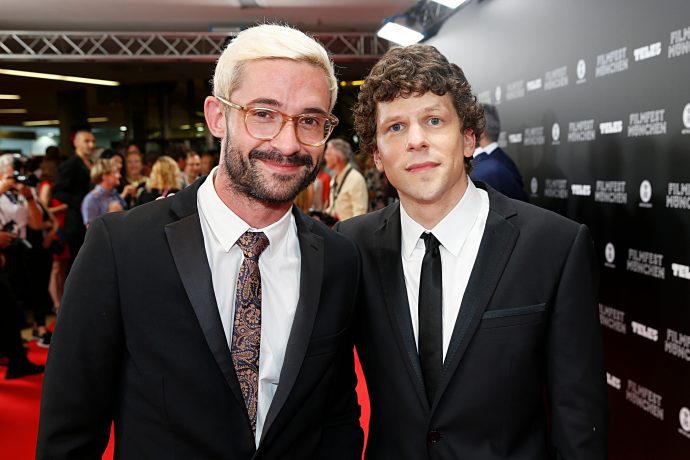
Interesting that Jesse wasn't your immediate go-to. He's perfect in this role.
Initially, I thought I wanted to cast somebody who was older. I wanted somebody in their forties. I felt like it would be sad and funny if somebody who is older felt like less of a man, training alongside teenagers.
This actor that Jesse knew I had offered the role to wrote me a super nice email, but it was like, "I can't play a weak character right now." I'm not exaggerating, that line is verbatim. I can't play a weak character right now. And I was like, I am making the right movie if this is scaring guys. And it's very cliche to say, but I cannot imagine anybody else in the role besides Jesse.
My favorite scene is when he has a total emotional breakdown in the car.
When we were shooting that scene, it was me and my cinematographer, Michael Ragen, in the car with him. We're setting up and starting to drive off and Jesse kind of takes a moment, there's a little silence, and he goes, "Alright so, no big deal I'm just gonna cry in front of my new best friends. Yeah, that's gonna be fine." Then he worked himself up and bawled, and ended up being so sweet and vulnerable at that moment.
...And now I've got a story about a pet psychic.
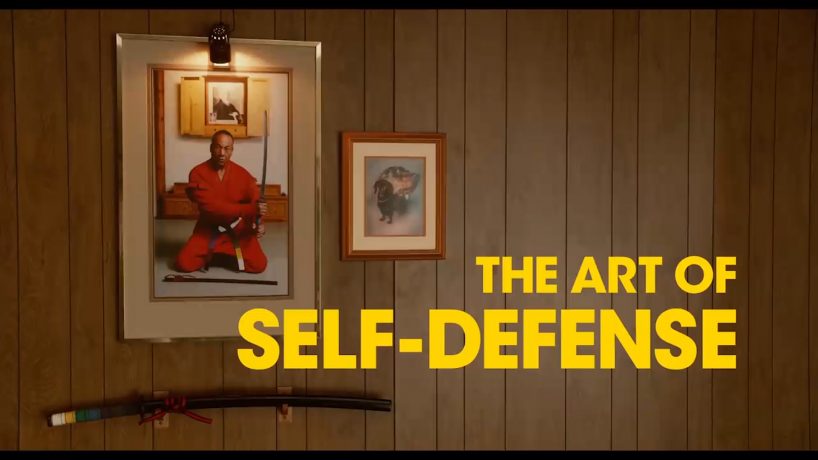
So, Mocha. I loved this dog.
I grew up with dachshunds. I have one, Didy, that my parents watch now. I've always loved the breed. But I also felt like it was the perfect companion and best friend for somebody like Casey. We were filming in Louisville, KY and there are not trained movie dogs in Louisville, so we had dachshund casting call one day, which was my favorite day I've ever had in my entire life. But none of the dogs behaved, even just sitting in one spot was hard.
I think I met five dogs that day and this dog, Mocha, was nervous and you can tell she couldn't really do what we wanted her to do. My producer, Cody Ryder, said she got an email from Mocha's owner and that she's a pet psychic, apparently. She said that she had a discussion with Mocha after the casting and said, 'I really know that you can do this and I think you need to be there to protect Riley. Mocha wants you guys to know that she can do it.' And we were like... Oh my God.
And now I've got a story about a pet psychic.
What was it like reaching out to Full of Hell?
I was writing the script and had been listening to Full of Hell on shuffle, specifically their collaboration with MERZBOW, a Japanese noise artist. It was abrasive and grindcore-y, and death metal-y, and kind of punky all mixed together. It feels like this exaggerated version of what metal is to people who don't listen to metal. I think people who don't listen to metal think Metallica is "metal."
I wanted to go really extreme, so I decided to reach out to Full of Hell and see if they would be willing to let us use their music. I sent the lead singer, Dylan, an email and a few minutes later I got an email back saying, 'Holy shit, my friend and I just watched Faults the other day. This is too weird. Yes, of course, you can use anything. We would be honored.'
Bleecker Street's been doing an incredible job with the way they've been incorporating some of our 'out of the box' ideas.
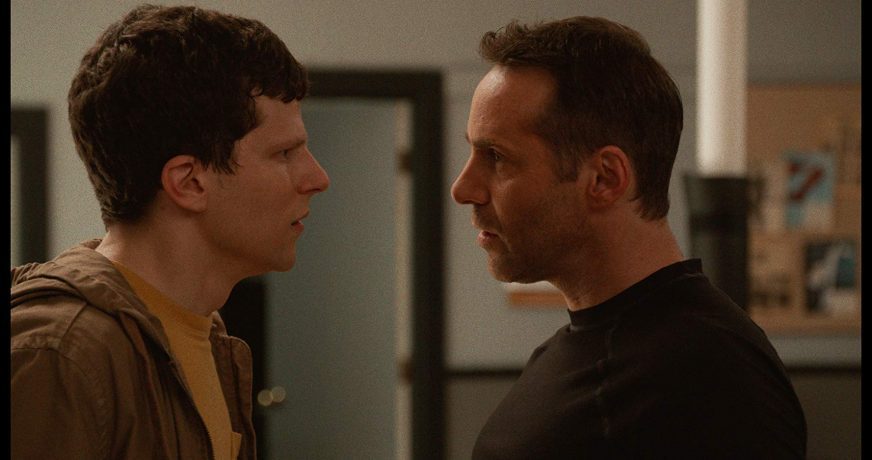
The display at the ArcLight Hollywood is incredible.
Bleecker Street asked what I wanted to be displayed and I said Jesse in his work clothes with the belt over it and Sensei with his sandals and ghee on. That's it. So I just thought that it was going to be two people standing there like all of the displays are. But the fact that Jesse's cowering in fear and Sensei is doing a karate stance – that was the surprise!
Bleecker Street seems to be treating you well.
Bleecker Street's been doing an incredible job with the way they've been incorporating some of our 'out of the box' ideas. I had this idea of doing a poster creative brief, so they partnered up with Poster Spy and we're going to have an alt poster, hopefully designed by a fan.
The creative direction goes out a little bit after the film is released so people will have a chance to see it and then create something. Just things like that, it's nice to think a little outside the box and have fun with the release.
On average, it takes 10 years to get your black belt in Jiu Jitsu.
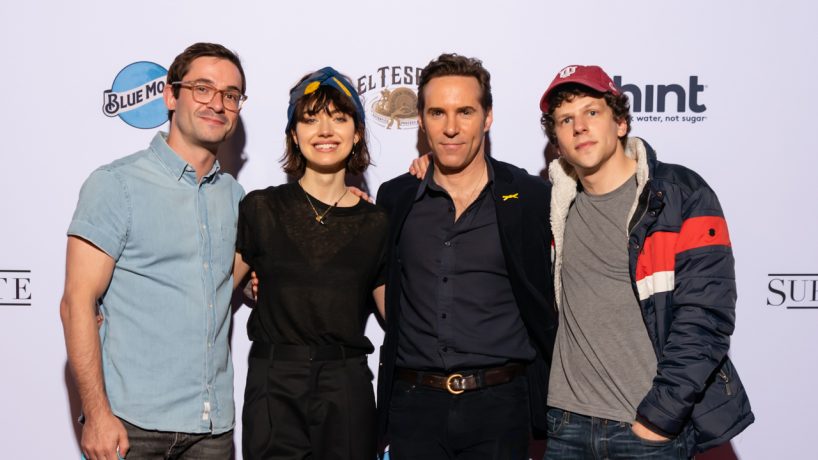
Important question: When do you find the time to bake bread?
I'm finding it here and there, haha. The biggest thing right now is worrying about my starter while I'm gone because it's alive. So I've got it out and I'm feeding it. Tomorrow, I'll put it in the fridge and it'll live in the fridge for the two weeks that I'm gone.
Do you see Black Belt status in your future?
On average, it takes 10 years to get your black belt in Jiu Jitsu. I've been training for 6 years, 5 days a week, I compete and I'm a purple belt, which is a middle belt. I like that structure.
I want to earn my belt in filmmaking too. I want it to be because of the movie, not because of other circumstances. I'm just glad that people are responding to The Art of Self-Defense in a way that's positive and excited and hopefully it leads to the next one.

